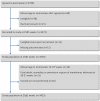A prospective cohort study investigating associations between hyperemesis gravidarum and cognitive, behavioural and emotional well-being in pregnancy
- PMID: 22125621
- PMCID: PMC3220681
- DOI: 10.1371/journal.pone.0027678
A prospective cohort study investigating associations between hyperemesis gravidarum and cognitive, behavioural and emotional well-being in pregnancy
Abstract
Objectives: To investigate the association between hyperemesis gravidarum and altered cognitive, behavioural and emotional well-being in pregnancy.
Methods: The study cohort consisted of 3423 nulliparous women recruited in the Screening for Pregnancy Endpoints (SCOPE) study performed in Auckland, New Zealand; Adelaide, Australia; Cork, Ireland; Manchester and London, United Kingdom between November 2004 and August 2008. Women were interviewed at 15±1 weeks' gestation and at 20±1weeks' gestation. Women with a diagnosis of hyperemesis gravidarum (HG) were compared with women who did not have a diagnosis of HG. Main outcome measures included the Short form State- Trait Anxiety Inventory (STAI) score (range 6-24), Perceived Stress Scale score (PSS, range 0-30), Edinburgh Postnatal Depression Scale (EPDS) score (range 0-30 or categories a-c) and behavioural responses to pregnancy score (limiting/resting [range 0-20] and all-or-nothing [range 0-28]).
Results: During the study period 164 women suffered from HG prior to their 15 week interview. Women with HG had significantly higher mean STAI, PSS, EPDS and limiting response to pregnancy scores compared to women without HG. These differences were observed at both 15±1 and 20±1 weeks' of gestation. The magnitude of these differences was greater in women with severe HG compared to all women with HG. Women with severe HG had an increased risk of having a spontaneous preterm birth compared with women without HG (adjusted OR 2.6 [95% C.I. 1.2, 5.7]).
Conclusion: This is the first large prospective study on women with HG. Women with HG, particularly severe HG, are at increased risk of cognitive, behavioural and emotional dysfunction in pregnancy. Women with severe HG had a higher rate of spontaneous preterm birth compared to women without HG. Further research is required to determine whether the provision of emotional support for women with HG is beneficial.
Conflict of interest statement
References
-
- Gazmararian JA, Petersen R, Jamieson DJ, Schild L, Adams MM, et al. Hospitalizations during pregnancy among managed care enrollees. Obstet Gynecol. 2002;100:94–100. - PubMed
-
- Tierson FD, Olsen CL, Hook EB. Nausea and vomiting of pregnancy and association with pregnancy outcome. Am J Obstet Gynecol. 1986;155:1017–1022. - PubMed
-
- Organisation WH International Statistical Classification of Diseases and Related Health Problems. 10th Revision. Version for 2007.
-
- Hod M, Orvieto R, Kaplan B, Friedman S, Ovadia J. Hyperemesis gravidarum. A review. J Reprod Med. 1994;39:605–612. - PubMed
Publication types
MeSH terms
LinkOut - more resources
Full Text Sources
Medical


